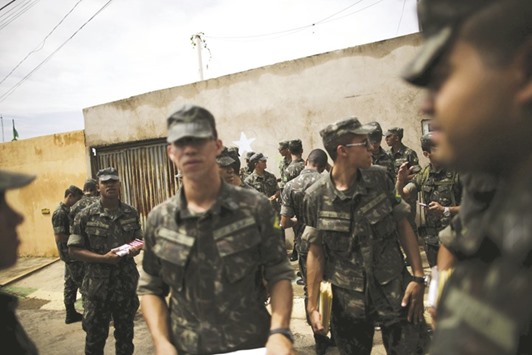
Brazilian soldiers conduct an inspection for the Aedes aegypti mosquito on a street of the Sao Sebastiao neighbourhood in Brasilia, Brazil.
The Brazilian military men surrounded the white bucket and moved in - the Zika-transmitting mosquito larvae didn’t stand a chance.
Naval officers and seamen in spotless, crisp uniforms had advanced on a flower pot in the suburban Rio house, meeting no enemy. Their next objective, a potted fern, was also enemy-free.
But in the bucket of water at the back of the house, the servicemen and an employee from the health department in Sao Goncalo, a seaside suburb of Rio de Janeiro, came face to face with Brazil’s dreaded foe: larvae of the Aedes aegypti mosquito.
After verifying the identity of the dots wriggling in the water, the sanitation worker dumped them on the ground to perish in the 34 degrees Celsius (93 Fahrenheit) sunshine.
In President Dilma Rousseff’s declared war against Zika and mosquitoes, Brazil had just notched up a tiny victory.
All along the same street in Sao Goncalo, teams of naval personnel and sanitation staff went house to house, garden to garden, flower pot to flower pot - anywhere where water might collect and allow mosquitoes a place to breed.
“The goal is to educate the public that everyone needs to take responsibility... and to investigate possible breeding sites,” said Commander Carlos Alexandre Souza de Lima, resplendent in his white uniform on the normally unremarkable residential street.
Across Brazil, some 55,000 other members of the navy, army and air force, plus 310,000 health workers, were deployed on that same mission, with some four million properties in their sights during a campaign that began Saturday and runs through Thursday.
Zika infections, transmitted by bites from the Aedes aegypti mosquito, have exploded in Latin America’s biggest country. They are blamed for an alarming spike in cases of microcephaly, a rare and serious birth defect.
The outbreak has been declared an international emergency by the World Health Organisation and at least in public relations terms poses a threat to Rio’s hosting of the Olympics this August - adding to pressure on Rousseff to find a solution.
With no vaccine against Zika, no cure for microcephaly and confusion over how much danger the virus - which in most cases produces few symptoms - really poses, Brazil’s main strategy is to attack the mosquito itself.
That might sound near impossible in a tropical country of 204mn people, but the involvement of the military is seen as giving Brazil at least a fighting chance.
Jorge Luis de Oliveira, 55, has been on anti-mosquito campaigns for decades as a member of the Sao Goncalo health department, mostly fighting dengue and chikungunya, which are carried by the same Aedes aegypti species.
But being backed by the military - one of the few institutions in Brazil that is broadly trusted - makes the job a lot easier, he said.
“It makes people more respectful,” he said. “Having the armed forces involved makes people realise that we’re all in this together.”
One of the residents opening his door yesterday, Mario Jorge de Carvalho, 56, said the sight of the military officers gave him confidence.
“People are afraid of letting in agents from the health department, but the presence of the soldiers, the navy, the military is going to help get access to all houses and businesses,” Carvalho, an electrical engineer, said.
